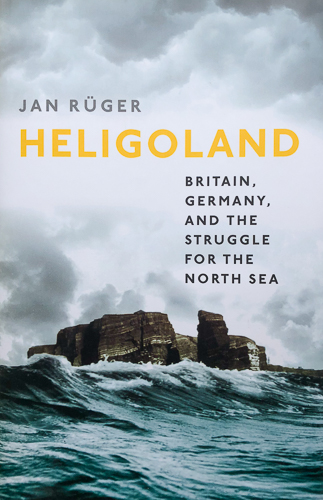
I bought Jan Rüger’s Heligoland on a hunch, having read two highly complimentary reviews. The hunch was that I would enjoy the book very much indeed, not least because the subject matter seemed to echo a number of themes explored by one of my favourite writers, W.G. Sebald. My hunch was correct: Heligoland is a fantastic read.
The eponymous subject of this book is a pair of small islands in the German Bight of the North Sea. Annexed from Denmark by the British during the Napoleonic Wars to prevent it becoming a French naval stronghold, the archipelago became a base for British wartime smuggling and espionage operations. It became an official British colony with the signing of the Treaty of Paris in 1814. Two years later, Heligoland rebranded as a seaside spa, which in later years (to the consternation of the British) became a major centre for gambling, and a refuge for German revolutionaries.
After the unification of Germany, Heligoland was much coveted by Bismarck, who saw it as a launchpad to German imperial ambitions. The colony was eventually horse-traded with Germany for unopposed British access to Zanzibar. The main island was heavily fortified by its new owners in advance of the First World War, during which, thanks to the new fortifications, it saw very little action. The fortifications were dismantled in line with a provision of the Versailles Treaty after the war. The resentment this caused in Germany became a major source of Nazi propaganda between the wars.
When the Nazis rose to power, they heavily refortified the main island. But the advent of aerial warfare had made Heligoland less strategically important. It was largely ignored by the allies during the Second World War until, in the final days of the war, it was blanket-bombed to such an extent that the Germans were forced to desert the island. To add insult to injury, in the years immediately after the war, the British used Heligoland as a bombing range. But the ultimate insult came in 1947, when they did their level best to level the island by setting off stockpiles of wartime munitions in a single ‘Big Bang’. The explosion changed the geology of the island forever. After a coordinated series of protests, Heligoland was finally returned to German control in 1947, where it remains to this day.
Rüger’s fascinating history of the archipelago is really a history of Anglo-German relations over the last two-hundred years. It shows how continent-wide political manoeuvrings had profound effects on the two tiny islands. It’s a wonderful example of describing major themes by concentrating on small, specific examples.
The Sebaldian themes that emerge throughout the book include the Napoleonic Wars, the North Sea (née German Ocean), the leisure activities of the idle rich, aerial warfare, war crimes, and walk-on parts by assorted artists and despots. Even Werner Heisenberg makes an unexpected appearance. It was during a prolonged visit to Heligoland in 1925 that he first formulated quantum theory: a circumstance that seems metaphorically apt, bearing in mind Heligoland’s uncertain position during much of its political history.
Highly recommended.
- Buy this book from Bookshop.org (UK) and help tax-paying, independent bookshops.
- Buy this book from Amazon.co.uk
- Buy this book from Amazon.com